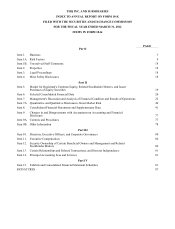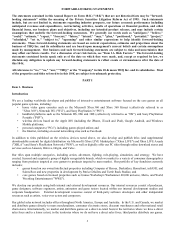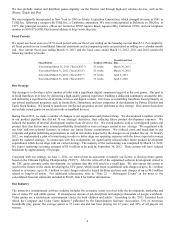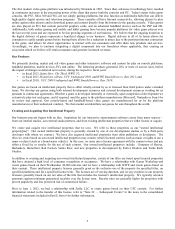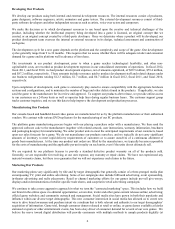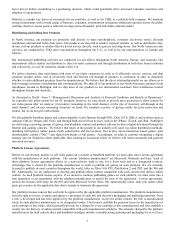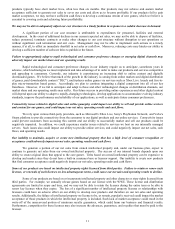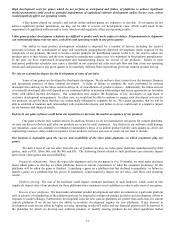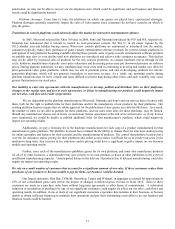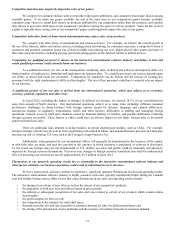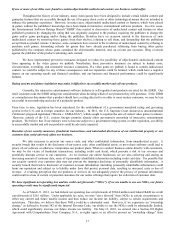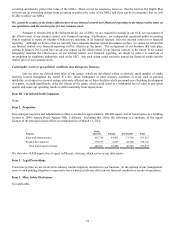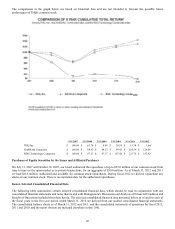THQ 2012 Annual Report Download - page 18
Download and view the complete annual report
Please find page 18 of the 2012 THQ annual report below. You can navigate through the pages in the report by either clicking on the pages listed below, or by using the keyword search tool below to find specific information within the annual report.10
our common stock closes at or above $1.00 per share for a minimum of 10 consecutive business days, Nasdaq will provide
written notification that we have achieved compliance with the Rule. If compliance with the Rule cannot be demonstrated by
July 23, 2012, our common stock will be subject to delisting from The Nasdaq Global Market. In the event that we receive
notice that our common stock is subject to being delisted from The Nasdaq Global Select Market, Nasdaq rules permit us to
appeal any delisting determination by the Nasdaq staff to a Nasdaq hearings panel.
On June 29, 2012, at a special meeting, our stockholders will vote on a proposal to approve an amendment to our certificate of
incorporation in order to effect a reverse stock split of our common stock at a ratio of one-for-three, one-for-five, or one-for-
ten, such ratio and effective date to be determined in the sole discretion of the Board (the “Reverse Stock Split”). It is
anticipated that the Reverse Stock Split will be effectuated on or about July 5, 2012. In the event that our stockholders fail to
approve the Reverse Stock Split or if our stock price fails to increase above $1.00 per share for a minimum of ten consecutive
business days following the Reverse Stock Split, or we fail to meet any of the other listing requirements in the future, we may
not be able to maintain our Nasdaq listing, which could have a material adverse effect on the market for and the market price of
our common stock.
We may not be able to refinance or generate sufficient cash to service and/or pay our convertible senior notes.
On August 4, 2009, we issued the convertible senior notes ("Notes"). The Notes pay interest semiannually, in arrears
on February 15 and August 15 of each year and are due August 15, 2014, unless earlier converted, redeemed or repurchased. If
we fail to maintain our listing with any U.S. national securities exchange, the holders of the Notes may require us to repay the
principal prior to the maturity date. Our ability to make principal and interest payments on the Notes will depend on our
financial and operating performance, which is subject to prevailing economic and competitive conditions and to certain
financial, business and other factors beyond our control. We may be unable to refinance the Notes or maintain a level of cash
flows from operating activities sufficient to permit us to pay the principal or interest on the Notes. In addition, if the Notes are
converted to common stock, our current stockholders will suffer dilution in their percentage ownership.
Our operating results may be adversely impacted by worldwide economic uncertainties.
Our products involve discretionary spending on the part of consumers. Consumers are generally more willing to
make discretionary purchases, including purchases of products like ours, during periods in which favorable economic
conditions prevail. As a result, our products are sensitive to general economic conditions and economic cycles. In the recent
past, general worldwide economic conditions have experienced a downturn due to slower economic activity, concerns about
inflation, increased energy costs, decreased consumer confidence, reduced corporate profits and capital spending, and adverse
business conditions. Any continuation or worsening of the current global economic and financial conditions could materially
adversely affect (i) our ability to raise, or the cost of, needed capital, (ii) our ability to properly budget and forecast for future
net sales and expenditures, and (iii) demand for our current and future products. We cannot predict the timing, strength, or
duration of any economic slowdown or subsequent economic recovery, worldwide, or in the video game industry.
Our business is "hit" driven. If we do not deliver "hit" games, our net sales, operating results and cash flows could suffer.
While many new titles are regularly introduced in our industry, increasingly, only a relatively small number of "hit"
titles account for a significant portion of video game sales. It is difficult to produce high-quality products and to predict prior to
production and distribution what products will be well received, even if they are well-reviewed, high-quality titles. "Hit"
products published by our competitors may take a larger share of consumer spending than anticipated, which could cause our
product sales to fall below expectations. Consumers may lose interest in a genre of games we produce. If we fail to develop
"hit" titles, or if "hit" products published by our competitors take a larger share of consumer spending than we anticipate, our
product sales could fall below our expectations, which could adversely impact our net sales, operating results and cash flows.
We will depend on a relatively small number of franchises for a significant portion of our net sales.
Because we no longer develop traditional kids' and movie-based licensed console games and have revised our strategy
to focus on our premium core franchises and to expand our digital revenues, we will depend on a smaller number of franchises
and titles for a significant portion of our net sales in the future. Due to this dependence on a limited number of franchises, the
failure to achieve anticipated results by one or more products based on these franchises may significantly impact our business
and financial results.
If our products fail to gain market acceptance, we may not have sufficient cash flow to pay our expenditures or to develop a
continuous stream of new games.
Our success depends on generating net sales from existing and new products. The market for video game products is
subject to continually changing consumer preferences and the frequent introduction of new products. As a result, video game



